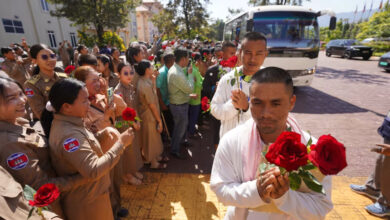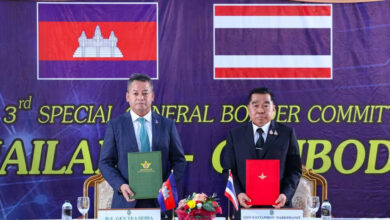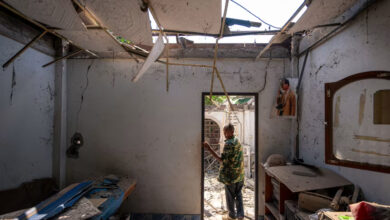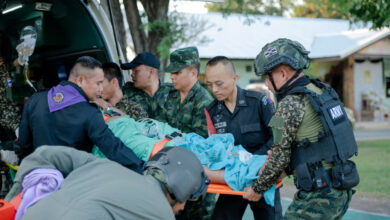
Thai police fired teargas and rubber bullets at anti-government protesters in Bangkok on Thursday after demonstrators tried to disrupt preparations for a February election, the clashes flaring after almost two weeks of relative calm.
The confrontation between police and about 500 protesters demanding the resignation of Prime Minister Yingluck Shinawatra came a day after the government extended a special security law by two months.
The protesters draw their strength from the south, Bangkok's middle class and elite, who dismiss Yingluck as a puppet of her self-exiled elder brother, former premier Thaksin Shinawatra, a populist hero among millions of poor in the north and northeast whose votes have won his parties every election since 2001.
Yingluck called a snap election for 2 February in an attempt to deflate weeks of mainly peaceful protests that, at their peak, have drawn 200,000 people on to the streets of Bangkok.
The clashes will pile pressure on her government, which has long suspected opponents would use violence to escalate the crisis to try to trigger an intervention, either by the military or judiciary, both of which have been politicized.
The military, which has moved against Thaksin's governments before, directly and indirectly, has insisted it is neutral and has offered to help ensure elections run smoothly and to mediate if peace talks take place.
Police said five officers were wounded, three when a gunman fired from a building towards police lines outside a stadium hosting a draw for election ballot numbers.
“I urge these people, especially whoever convinced the protesters to use violence, invade the building and attack officers, to please stop,” police spokesman Piya Uthayo told Thai television.
The Public Health Ministry said 34 protesters were treated in hospital, mostly from tear gas. Three were hit by rubber bullets and another seriously wounded after being shot in the head by a live round.
Protesters, led by fiery former deputy premier Suthep Thaugsuban, have vowed to disrupt the election and hound Yingluck from office. About 2,000 gathered outside her home in a northern Bangkok suburb, although she was not there.
Uncertain election
The demonstrators want to suspend Thailand's fragile democracy, which they say has been subverted by Thaksin, and to have an appointed “people's council” take over and implement reforms before any election is called.
The poll has been made more uncertain by a boycott by the main opposition Democrat Party, which is backed by an establishment of influential aristocrats, former generals and old-money families who resent Thaksin's rapid rise and say he is entrenching corruption and damaging the country.
On Wednesday, Yingluck proposed the creation of an independent reform council to run alongside the elected government, an apparent attempt at compromise that was immediately rejected by the protesters.
National Security Council head Paradorn Pattanathabutr said the police response on Thursday did not mark a change of approach to handling the protests.
“We have warned them and informed them every time before firing teargas,” Paradorn told Reuters.
Police fired teargas grenades and rubber bullets when demonstrators tried to break down a fence. The protesters, some of whom had been throwing rocks, soon withdrew.
Protesters are well prepared for such clashes, the last of which happened about two weeks ago. Many carry goggles and masks and bring water to wash out their eyes.
Yingluck has not been in the capital for most of the past week, choosing instead to shore up her support in her power base to the north, and will not return to Bangkok until the New Year.
Her Puea Thai Party is almost certain to prevail in the election and extend a 12-year winning streak by Thaksin's populist political juggernaut, which has overcome violent street protests and judicial and military intervention in the past.
Thaksin was overthrown in a 2006 coup and has been in self-imposed exile since 2008, when he fled before being jailed on graft charges he says were politically motivated.
The first two years of Yingluck's government were relatively smooth, until her party miscalculated in November and tried to push an amnesty bill through the Senate that would have allowed her brother to return home a free man.




